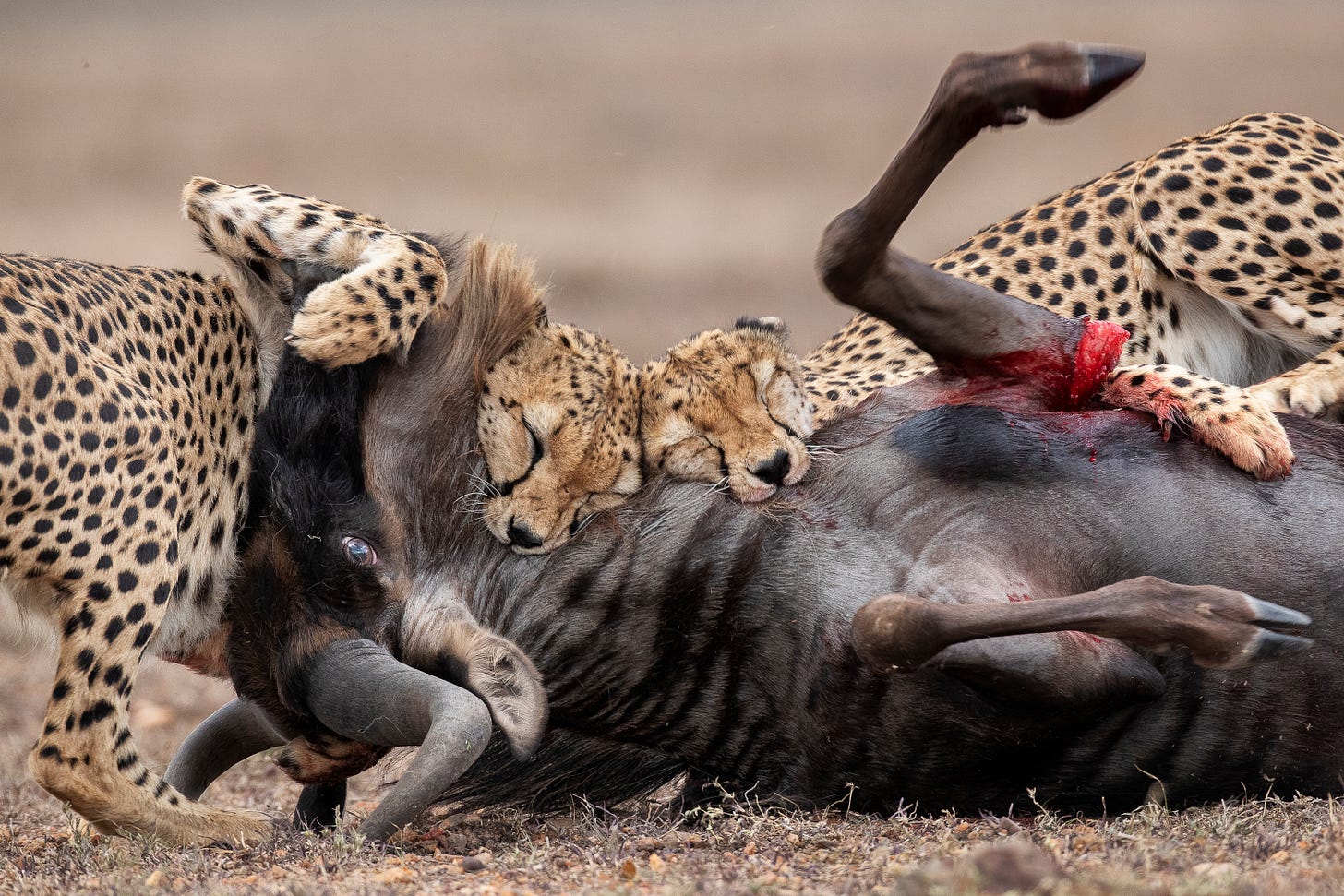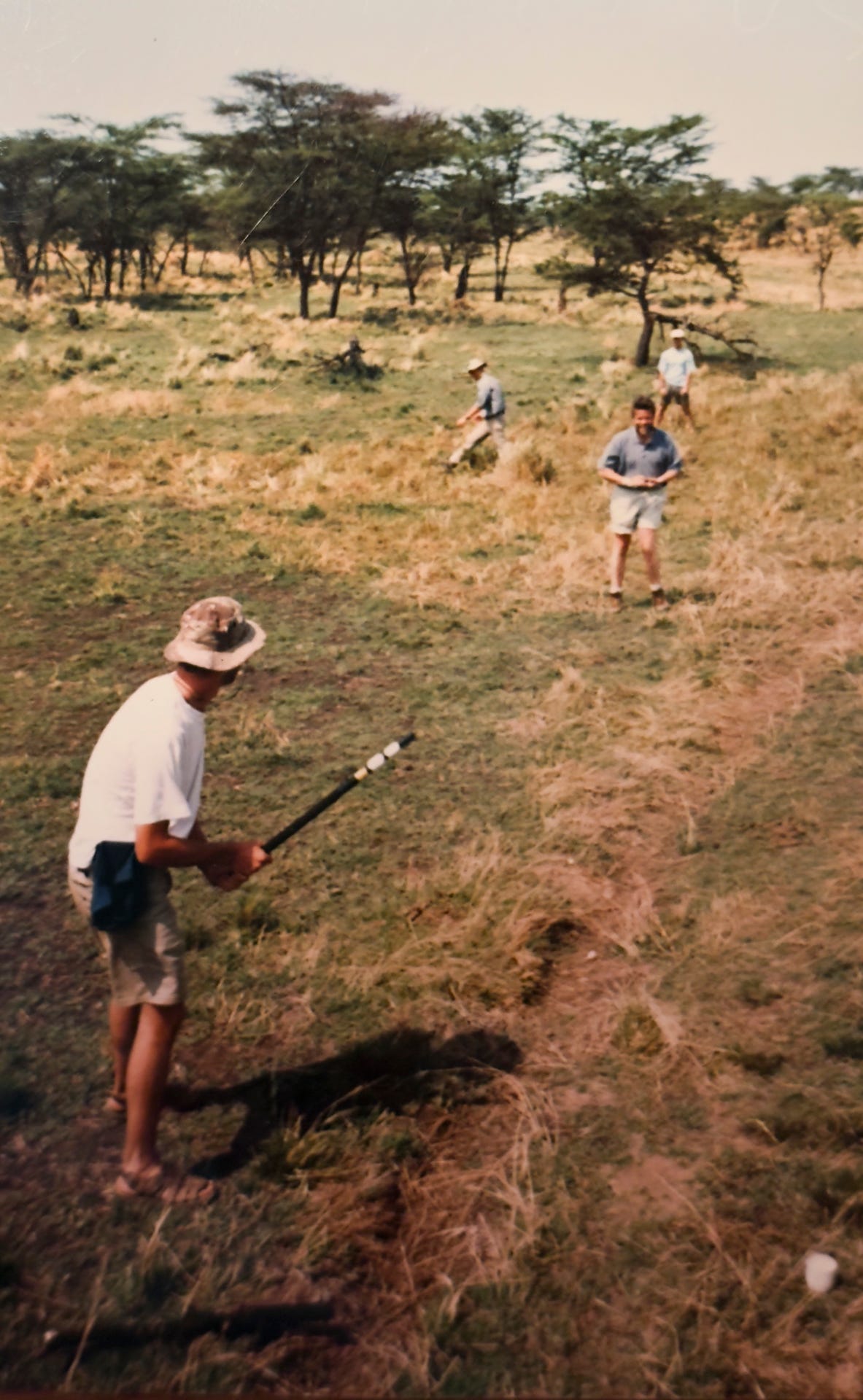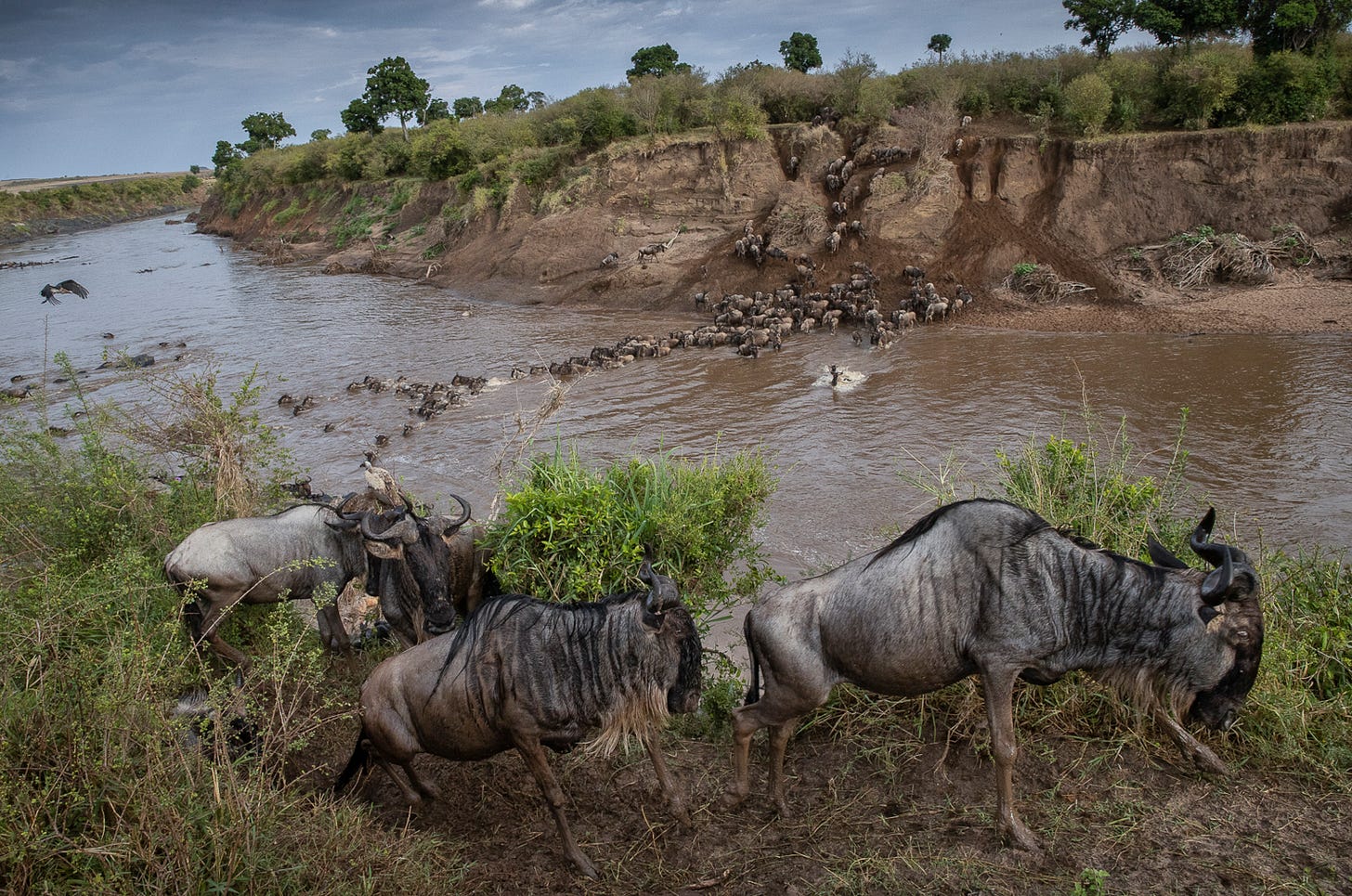Catch up on previous chapters here
Big Cat Diary
In late 1998 I convinced Keith to give me a break from Living Britain and join a team heading to the Maasai Mara in Kenya to film Big Cat Diary. My parents had banned television when we were kids and it was only ever dragged out for wildlife films. This meant I’d grown up watching all the classic David Attenborough films, my favourite sequences being the wildebeest crossing the Mara River and being eaten by crocodiles. Dad would always get animated and excited when they came on and enthuse the rest of us. I’d dreamt of going to Africa and seeing the crossings ever since.

Finally arriving there in my early twenties to film the megafauna of East Africa was a dream come true. I had never seen anything like it. It was a land just dripping with animals, everywhere I looked – herds of elephants, harems of impala, zebras, hyenas, and, of course, lions, cheetahs and leopards – our main subjects. We had a private camp perched precariously on the steep mud banks of the Mara River, thick with hippos and crocs, which we’d watch from the safety of the bar, and an endless stream of pied and woodland kingfishers, which excited me the most. At night the lions would come into camp and play with the guy ropes of our tents, which was terrifying but hugely exciting at the same time.
Our days were spent in Land Cruisers, trotting around in second gear from dawn to dusk, looking for animals to film. Every day we’d find some exciting drama unfolding – hyenas taking down a zebra, cheetahs nailing gazelles, lion prides fighting each other. Knowing something would happen when we drove out in the morning, but not knowing what it was going to be, was addictive. I got to work alongside my heroes – Martyn Colbeck, Simon King, Warren Samuels, Jonathan Scott – and then get hammered in the bar with them every night.
Big Cat Diary was more a party than a production. It was white mischief in its purest form – back-of-the-car hangover siestas, sundowners with gin and tonics, long nights drinking and smoking, and everyone fucking everyone else. The budgets were expansive, and needed to be; our excess baggage bill alone was £30k on the way out. We had edit suites on site, a tent of games consoles, and we even had a table tennis table flown out from Nairobi, which got wet and warped in the rain, so they flew out another one for us. Nowadays if you got your notebook wet and requested another one from the BBC, it would take six weeks to arrive from an outsourced stationery department and you’d have to fill in hundreds of pages of paperwork, including a risk assessment for paper cuts.
The team was composed of producers, editors, production managers, execs, cameramen and a young guy called Aidan, who’d been pulled in, with no experience, to locate leopards, which are notoriously difficult to find. Aidan had thick glasses and his eyesight without them was terrible, but with them he spotted just about every leopard that was filmed. He and I hit it off immediately. He was engaging and funny and told absurdly longwinded stories, overloaded with obvious lies and exaggeration, which almost always went nowhere but were always hilarious. Being the youngest on the team, Aidan and I were keen to prove ourselves. We decided that we’d try and be the first to film the wildebeest crossings that year, knowing that the events would be dramatic and powerful on screen. The great migration, of 1.4 million wildebeest, would usually pop up into the Maasai Mara from the Serengeti in northern Tanzania in mid-July, but it was late and nobody had yet filmed it.
We began making daily visits to the river to see if any wildebeest had arrived along its edges to make the crossing. Late one afternoon we pulled up under a tree, sat on the roof, opened a bottle of red wine and rolled up some of the Malawi Gold that Aidan had smuggled across the border in his washbag. As we sat there getting progressively more drunk and stoned, we watched a growing number of wildebeest corpses floating down the river. It was twenty minutes before it occurred to us that if so many corpses were floating down, then the wildebeest must be crossing up-river. We jumped into the car and sped along the edge of the river as fast as we could.
After half a mile or so we reached a huge, dense croton thicket; the wildebeest were rushing out of it, away from the river and back to the plains. We drove through them and along a track to the river, just as the last few animals of what looked to be a big herd vanished through the bushes. We’d missed the crossing. We were gutted. A few broken wildebeest, thick with mud, struggled on the opposite bank, groaning and dying; while midstream the huge crocodiles ripped at corpses, grabbing limbs and rolling them with terrifying ferocity.
We sat around for half an hour watching the scene gently return to normal, eventually assuaging our guilt by giggling at our stupidity, then reluctantly headed off. We made our way back along the track, away from the river, heading for home, but as we broke out of the woods towards the plain, we turned the car to face a stampede of wildebeest, galloping our way. It was like a huge army, tailing back as far as we could see. Aidan threw the car into reverse as the front runners began to pass us. We sped back to the river and drove through the herd that had already began crowding onto the edge. I scrambled for my camera as Aidan parked us up on a rise above the scene and immediately began filming. The mooing and grunting of the nervous animals was intense and almost deafening. They milled about, agitated, as the burgeoning numbers, piling in from the woods behind, squashed the front of the herd right to the edge of the river. The crocs gently sunk low and remained still.
And then, with nowhere left to go, one animal made the leap into the swirling brown water and began the frantic swim to the other side. As it did, others followed, until the entire herd collapsed in behind. Bulls, females with calves, lone yearlings – all forged tightly in together, several abreast, flowing in like a river. As the first animals reached the safety of the opposite side they faced a steep bank, already thick with sticky mud from the previous crossing. The first few made it with ease, but the ever-increasing numbers rushing in behind them began to get stuck and panic, and the line buckled as those in the water had nowhere to go.
I was throwing the camera all over the place, trying to capture as much as I could within the chaos, to Aidan’s running commentary. One lone adult broke away from the main herd as they backed up in the mid-section of the river. The swift current pushed it down towards an enormous croc, who moved in but just missed it as it fought hard to reach the bank, only to be faced with a sheer cliff of mud. With nowhere to go it climbed out onto a small ledge a couple of feet above the water and watched helplessly as the croc swam over to it, grabbed it by the ankle and dragged it down. I managed to swing the camera onto the hapless creature just in time to capture it as it was pulled under, gurgling its last.
The herd eventually became so huge that it engulfed our car, and we sat filming in a teeming sea of brown backs and horns. I kept having to check the camera’s record light was on, in case I’d forgotten to press it in my excitement. I was lost, though, unable to find anything to concentrate on as it was all so dramatic. Then, suddenly, the entire herd around the car burst and scattered in a billowing cloud of dust, which cleared a second later to reveal a lioness standing alone. As I swung the camera onto her she vanished back into a thicket to reset her trap, and as she did the wildebeest crowded back in and continued to cross.
A moment later a white pick-up appeared and drove right through the middle of the herd, pulling up on the edge of the river in front of us. I was furious as it blocked my view. A couple from the US then got out the car, pulled their two toddlers from the back seats and walked to the edge of the river to crouch down and watch. The wildebeest, already terrified, became even more agitated and the line flowing into the water bent away from the family. Aidan shouted over to them: ‘You know the river is full of crocodiles and there’s a lion hunting right by your car?’ The stupidity of people around wild animals never ceases to amaze me. It’s born out of ignorance, of course, but also from the arrogance of sitting right atop the food chain.
When the crossing eventually dragged to a halt, perhaps half an hour later, the view resembled a battle scene. Corpses bobbed in the shallows and eddies, piling up against the large boulders and tree trunks that struck proud of the flow. Crocodiles methodically cruised the edges, picking off stragglers as they called desperately to the rest of the herd while they fought to stand with bent and broken limbs. Above the bank on the far side more animals lay battered and exhausted. Some were calves who’d lost their mothers and were calling out to them. One confused calf decided to go back to where it last saw its mother and tried to cross the river. It never made it. The sound a wildebeest makes when it’s dragged under by a crocodile is truly disturbing – the moo turns to a wretched whinny as the croc takes it in its jaws and lets out a quick gurgle as it drags the poor animal beneath the surface.
A golden light from the setting sun had now spread across the scene, and a family of hippos moved back into the centre of the river, effortlessly hanging still in the fast current as they snorted and jostled aggressively with each other. Hyenas appeared, skulking along the top of the bank and then down to the edges when they spotted a helpless victim, which they’d eat alive. Enormous Rüppell’s and white-backed vultures began dropping from the sky as the banquet turned ever more red, forming an impatient wake around the hyenas, who’d get irritated by them every minute or so and run at them to shoo them off. It was a spectacle so savage and awful, but incredibly beautiful, like an exquisite diorama.
We sped back into camp that night, excited and proud of ourselves. I ran over to the edit suite, smugly and loudly announcing our victory to everyone as they sat enjoying their evening drinks. Andy, the film editor, loaded the tape from my camera as the producers, executive producers, directors and the other cameramen all gathered into the edit tent to watch it play out on the screen. As the first shots came up I proudly sat back in my chair to let them see what I’d got.
They tore me apart like a pack of hyenas. My footage was awful. It was over-exposed, panicked, wobbly, constantly moving, and the most important bits of action were out of focus. I hadn’t changed shot sizes enough, so there wasn’t even enough material to cut a sequence.
As the criticism turned to frustrated silence my heroes and peers slowly peeled away back to their drinks, leaving me alone in my chair, crushed and utterly humiliated.
Postscript
A few years later the BBC instructed the executive producer to diversify Big Cat Diary while in the field. She attempted to accomplish this by asking the cameramen to film the bar and camp staff singing and playing musical instruments. They refused.
In the next instalment I visit the Amazon for the first time and a life long love / hate relationship begins.







Wow! Only two vehicles at a crossing. That alone would be an incredible experience. What is this Malawi Gold you speak of? Ha ha. Excellent chapter enjoyed with my morning coffee. Looking forward to the next one.
Great story telling I can feel the excitement of you and the desperation of the wildebeest